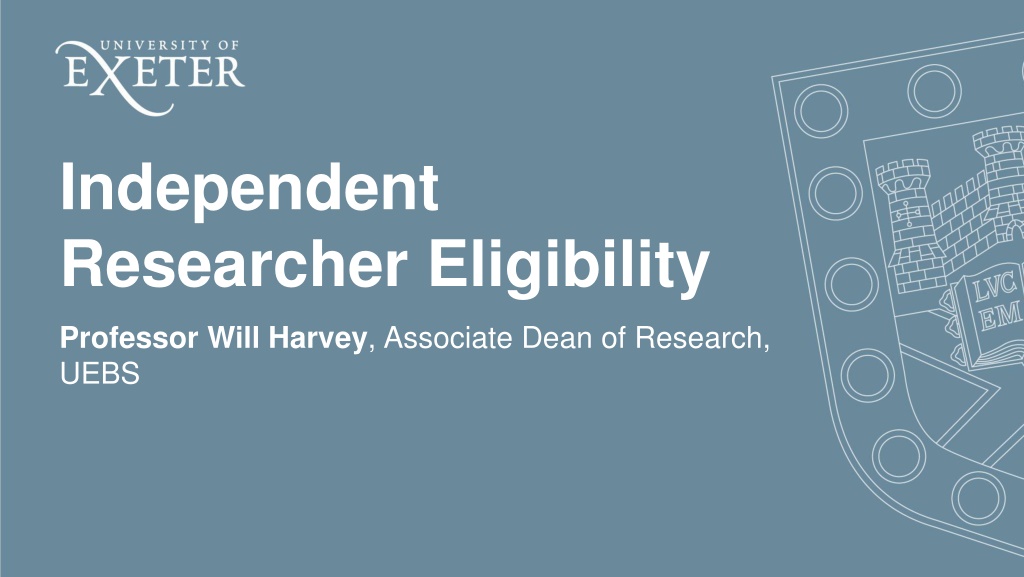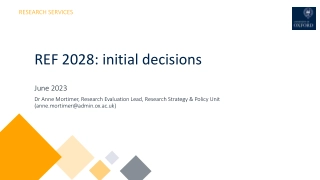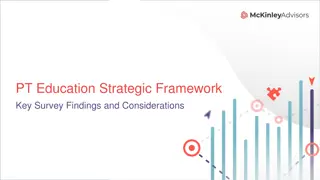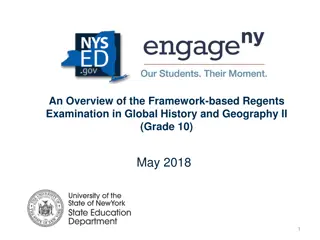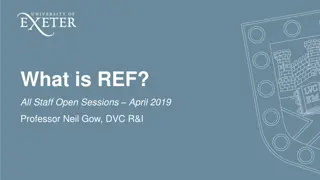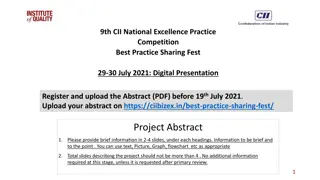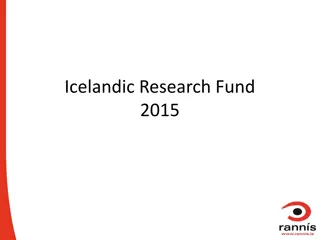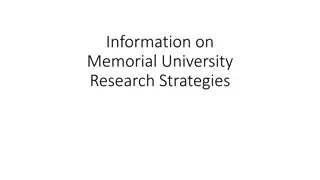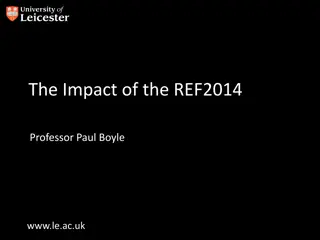Understanding Research Excellence Framework (REF) 2021
REF 2021 is a national assessment of research in UK universities based on research outputs, impact, and environment. It influences funding allocation and aims to enhance institutional reputation. Individuals benefit indirectly through salary support and reputation enhancement. The process emphasizes collective responsibility with no individual scrutiny. Changes since REF 2014 include eligibility criteria and output selection processes. The submission involves Units of Assessment grouped into four main panels. Emphasis is on openness, transparency, and inclusivity in preparations for REF 2021.
Download Presentation

Please find below an Image/Link to download the presentation.
The content on the website is provided AS IS for your information and personal use only. It may not be sold, licensed, or shared on other websites without obtaining consent from the author. Download presentation by click this link. If you encounter any issues during the download, it is possible that the publisher has removed the file from their server.
E N D
Presentation Transcript
Independent Researcher Eligibility Professor Will Harvey, Associate Dean of Research, UEBS
What is REF? Research Excellence Framework: a national assessment of research at UK universities by discipline The university s allocation of Quality-Related research funding is based on our REF performance REF is an assessment of three things: 60% RESEARCH OUTPUTS: from all staff with significant responsibilities for research 25% IMPACT: assessment of impact case studies .. PLUS an Institutional Environment statement pilot, scored but not included in profile scores Environment: an assessment a narrative statement and data 15%
Units of Assessment Disciplines are listed/grouped as Units of Assessment or Sub-panels REF2021 has 34 Units of Assessment; we will be submitting to 25-26 Units of Assessment. Sub-panels are grouped into four Main Panels: Main Panel A: Medicine/Life Sciences [UoA 1-6] Main Panel B: Physicals Sciences, Engineering and Technology [UoA 7-13] Main Panel C: Social Sciences [UoA 14 24] Main Panel D: Humanities [UoA 25 34]
Significant changes since REF2014 Processes for Eligibility not Selection of people Output variability (min. 1 output, max. 5 outputs); Portability/non- portability: transitional arrangements for outputs of former staff Output selection processes and consideration of EDI Approach to individual circumstances is more complex
Our approach to REF2021 Openness, transparency, accountability and inclusivity with an emphasis on collective responsibility in our REF2021 preparations. A team approach to Exeter s submission an ethos that reflects the collective responsibility point and recognises that everyone contributes to REF. This is not an exercise of individual scrutiny; everyone contributes directly or indirectly. Celebrating our successes
What does REF2021 mean to the individual? Helps pay our salaries/research time and contributes towards research activity costs It enhances institutional/departmental/discipline s reputation nationally and globally However . It does not directly relate to promotion, probation or recruitment The names of people submitted will not be published
What does REF2021 mean for someone on a Research contract? REF2021 recognises that some of you are in a transitional stage of your career (or have specific roles and responsibilities) and for contractual/administrative reasons you may not be eligible. If you meet the REF definition of eligibility and you are at Exeter on the census date, you must be returned If you leave to a different post, publications/outputs produced at Exeter, might be submitted here (specific policy applies)
Code of Practice: our policies and processes Our Code of Practice lists our policies on: Independent Researcher eligibility How outputs are selected Selecting outputs of staff who have left Link to the University of Exeter Code of Practice: https://www.exeter.ac.uk/research/services/ref/ref2021/
Staff who are potentially eligible for REF2021 Only staff on research-related contracts as reported annually to HESA - can be considered for REF2021 The contract types are:
Definitions for eligibility For submission to REF, we must demonstrate that a person meets the REF2021 definition of: Significant responsibility for research Independent Researcher
Significant responsibility of research The criteria for significant responsibility for research includes: All staff on Education and Research (E&R) contracts are expected to have significant responsibility for research 1. 2. All staff on E&R contracts will be returned to REF2021 3.
Independent Researcher the REF2021 definition The REF2021 definition of an Independent Researcher is: an individual who undertakes self-directed research, rather than carrying out another individual s research programme. This is not a judgment on a researcher s independence of thought or ability to work independently. The guidance includes specific qualifying criteria for all four Main Panels; with additional criteria for Panel C&D
Independent Researcher qualifying criteria For all four main panels And, for Mains Panels C and D only 1. 4. 2. 5. 3.
Independent Researcher PRELIMINARY STAGE Directors of Research/UoAs have reviewed lists of all staff on Research Only (Grade F and above) contracts in May 2019 based on information held within University records (mainly grants information) Staff who meet the REF2021 definition will be notified that they are eligible All other staff on Research contracts (Grade F and above) will be invited to the Open Process
INDEPENDENT RESEARCHER OPEN PROCESS
What is the Open Process for? Allows us all to ensure that we haven t missed anyone who is eligible It allows individuals to: give further information about how they some of the indicators; Provide information on grants held at previous posts that Exeter is unaware of; Explanation/further information of how you meet the indicators. Your Director of Research is your key point of contact within your UoA do discuss this with them or your line manager or Head of Department
Open Process timetable Staff on Research contracts at Grade F and above invited to complete a form in July 2019 (deadline early September 2019) Form reviewed by the Eligibility Review Group; College Associate Deans of Research invited as observers. Staff are notified in October 2019 if they meet the REF2021 Independent Researcher definition. Eligibility Review Group will also consider eligibility in February 2020, April 2020 and July 2020 The forms will be available online until July 2020 for new staff or staff who have since met the criteria.
The Independent Research form Asks new staff for details of research grants and/or staff about research grants held at previous universities as PI (or as Co-I for Panel C or D units of assessment) Details of competitive research fellowships A brief explanation of how you meet: Indicator 3: Leading a research group or a substantial or specialised work package Indicator 5: Having a significant input into the design, conduct and interpretation of the research (Panel C and Panel D only)
If you meet the REF2021 eligibility, your REF2021 to-do list Publish your best work Be compliant with the REF2021 and University Open Access Policy Register for an ORCID number Gather supporting evidence for impact case studies (where applicable) Support your DoRs and DoIs Provide confidential information about your individual circumstance if required
Questions? Email: Exeter-REF- 2021@Exeter.ac.uk Website: http://www.exeter.ac.uk/researc h/services/ref/ref2021/
